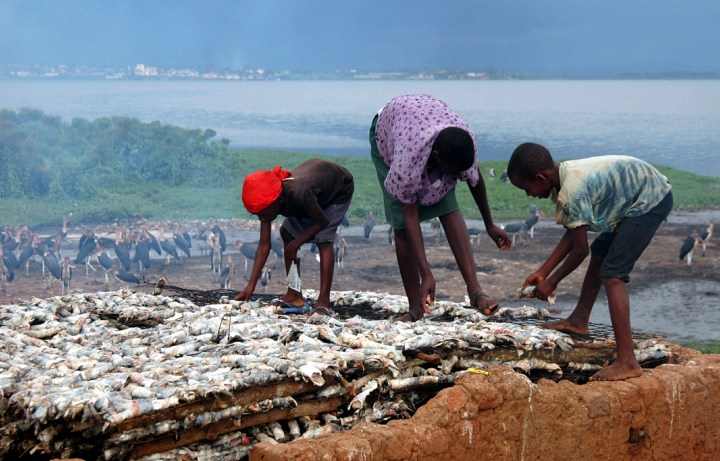It may sound like an ancient tale: two sovereign states that start an armed conflict over an insignificant speck of dirt. Not possible anymore? Think again. A tiny island in Lake Victoria is the object of a tug of war between Kenya and Uganda. By KHADIJA PATEL.
Lake Victoria, the largest of all African Lakes, is divided among the three east African countries. The northern half belongs to Uganda, the southern to Tanzania, and part of the north-eastern sector belongs to Kenya. This is, after all, the second widest freshwater body in the world. Schoolchildren in Uganda would promise to love each other, not until the end of time but until the mighty lake dries. It seemed unlikely that the lake would actually dry but then in the mid-nineties, the lake began to recede, revealing not only the caprice of young love but more significantly causing little islands to prop up over the lake’s waters.
One such island is Migingo. Before the lake began receding, this island was no more than a rock protruding from the water. Now it is an acre of rocky, unfertile land, home to more than 1,000 fishermen, which is the object of a tug of war between Uganda and Kenya. The fishermen on the island are predominantly Kenyan nationals. The island is itself said to be closer to Kenya than Uganda but Uganda claims sovereignty over the island anyway.
In 2004, the government of Uganda posted armed police and marines on the island and hoisted the Ugandan national flag on the island, unequivocally claiming the island for itself. Kenyan fishermen on the island are now required to obtain special permits from the Ugandan government to continue fishing around it. In 2007, Kenya, under pressure from their citizens on the island complaining about harassment from Ugandan officials, sent a small contingent of police to the island but later withdrew to avoid going to war with its sometimes belligerent neighbour.
In 2009, Ugandan president Yoweri Museveni, speaking to students of the University of Dar es Salaam in Tanzania, argued that though the island was indeed in Kenya, the waters surrounding it were in Uganda. Museveni asserted that Luos, the Kenyan community who form the majority of the Migingo Island’s inhabitants would not be permitted to fish in Ugandan territory. Emmanuel Kisiangani, a senior researcher in the African Conflict Prevention Programme at the Pretoria office of the Institute of Security Studies believes the real battle between Kenya and Uganda is not over the island itself, but a fight over scarce resources: fishing rights. “While the size of Kenya’s fish industry is averaged at 180,000 metric tonnes annually, with about 92% of this coming from Lake Victoria, Uganda only exported about 22,731 metric tonnes of fish despite controlling the second largest portion of the lake – 43%. It is this perceived imbalance and the declining fish resources in the lake that inform the root causes of the Migingo dispute,” says Kisiangani.
On Tuesday this week, tensions on the island were heightened after Kenyan police officers arrived. The Ugandan version of events claim there was no space for the newly arrived Kenyan bureaucrats on the densely populated island, the Kenyan version contends that Ugandan officials refused entry to the Kenyans. An armed altercation seemed likely as the Ugandans and Kenyans both reacted angrily to the reception of the Kenyan police on the island. As the Kenyan police were allowed back on the island a day later, calm was restored and Kisiangani believes a cross border conflict has, for the meanwhile at least, been averted. “At this time an armed conflict is not likely,” says Kisiangani.
The Ugandans further raised the ire of the Kenyans by seizing the neighbouring Ugingo Island, which had been uninhabited, prompting Kenyan leaders to demand action, saying the move was “a joke taken too far by a hostile neighbour”. According to Kisiangane, “The problem reflect(s) the divisive legacy of colonial boundaries in Africa and the lack of instruments to address border disputes on the continent.”
A survey team tasked with investigating to whom exactly the island belongs was led by Kenya’s director of survey Ephantus Murage and Uganda’s commissioner for Survey and Mapping, Moddy Kajumbula. But the survey was abandoned after the Ugandans returned to Kampala for consultations with the government and never returned. East African media report that a source in the team indicated that the contested islands Migingo and Ugingo were found to be Kenyan territory “beyond any reasonable doubt based on historical maps and GPRS systems”.
The latest escalation in tensions between the east African neighbours occurred after a high level meeting between Kenyan and Ugandan governments held in Nairobi agreed that the Migingo island would be administered by police officials from both countries. The spat between the two countries is due to be resolved in the coming months but it remains unclear how exactly Uganda will react to a final finding that may not support its claims of sovereignty. “Uganda,” according to Kisiangane “may want to delay the process” to hold off such a finding. In the meanwhile, tensions on the island remain high as the Kenyans and Ugandans regard each other with ever-deepening suspicion. DM
Read more:
- Survey on Migingo island resumes in Daily Nation (Kenya);
- Kenya: Orengo’s Word On Migingo Row in AllAfrica.com.
Photo: Women and children cure fish in the small Lake Victoria port of Ggaba, Uganda March 8, 2006.




















 Become an Insider
Become an Insider